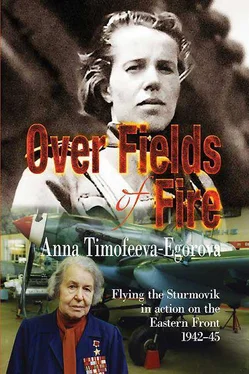We all knew that Anya and Louka were in love — they were not making a secret of it. Louka, a native of a small village lost in the Belorussian forests, having come to Moscow to live with his uncle, joined an FZU and soon he started working as a sinker in a Metrostroy shaft and studying in the aeroclub. Upon completion of our aeroclub’s course he was assigned with Koutov and other guys to the Borisoglebsk Military Flying School. After graduation Junior Lieutenant Louka Zakharovich Mouravitskiy served in the Far East but the War found him in the Moscow Military District. He took part in aerial battles in his yastrebok 36 36 Translator’s note — literally, ‘little hawk’ — a common nickname for Soviet fighters.
at the far approaches to Moscow, later near Leningrad. The flight commander Mouravitskiy distinguished himself not only by his sober-mindedness in calculations and his gallantry but also by his readiness to do anything to defeat the enemy. At the same time it seemed strange to everyone that Louka would write with white paint ‘For Anya’ on each one of his planes. The commanders kept ordering the flight commander Mouravitskiy to erase the inscription immediately, but before a combat flight the inscription ‘For Anya’ would appear again. Nobody knew who this Anya was, whom Louka remembered even going into battle… Once just before a combat sortie his regiment commander ordered Mouravitskiy to erase the inscription and said “Don’t let it happen again!” And it was then that Louka told the commander about his lost bride: “Even though she didn’t die in combat”, Louka went on, “she was going to become an aerial fighter to defend our motherland”. The regimental commander backed down…
In this very sortie Louka rammed a Heinkel He 111 bomber that was breaking through to a railway station defended by his lone plane. The enemy plane hit vacant ground beyond the railway and Louka barely managed to land his badly-damaged fighter near the station. After receiving medical treatment he returned to his regiment — and new battles several times a day followed… On 22 October 1941, four months after the War had broken out, Louka Zakharovich Mouravitskiy was awarded the Gold Star of a Hero of the Soviet Union for fortitude and valour during combat operations. And on the 30th of November 1941 Louka Mouravitskiy died a hero, defending the city of Leningrad.
8. Fate plays with human life
Ihad been banished from the sky in the Ulyanovsk flying school and my dream had been ruined. The rainbow had led me astray… The Secretary of the City Comsomol Committee where I had applied, stood silent for a long while. Then he rubbed his hands, scratched his head, combed with his fingers his crew-cut of light brown hair and hotly exclaimed, “I’ve got it, Egorova! You will go to work as a Pioneer 37 37 Editor’s note — a pro-Communist organisation for 9-14 year old children in the USSR, similar to the Scout movement.
leader in an NKVD labour colony for juvenile offenders. 38 38 Translator’s note — a penal colony run by the NKVD — People’s Commissariat of Internal Affairs.
You’ll be there until the next draft to the flying school. Over that time all this will have settled down, your brother is sure to have been released and you will join again. The head of the colony is a good man — he’ll understand. Anyway, let’s go and see him…”
Thus I settled at the colony in a small room of a wooden house. The colony occupied a large three-storey red-brick building located almost in the centre of Ulyanovsk in Bazarnaya Square. A large yard with shacks and workshops was adjacent to the building. All the kids studied in classes for four hours and for four hours they worked here in the yard in the workshops.
Of course, it was difficult to build a team from juvenile criminals. Each kid, aged from 8 to 16, already had a criminal record. Each group had its ‘warlord’ and I decided to start with him. But how would I pinpoint him? I began by simply walking around, watching and listening. I would come to a class, sit at the back, and observe how their life went on. The exercise books issued by the Russian teacher for dictation would instantly turn into playing cards and a real ‘battle’ would begin. Anything might be lost up to or including dinner. In the canteen you might see a scene such as one boy, stuffed, having eaten several dinners, and the losers drooling…
My suggestion of joining hobby groups: shooting, aircraft modelling, sailing, got not so much as a nibble. But after watching closely a couple more times and consulting with the tutors and teachers I selected eight boys from different groups and walked them to the Pioneers’ Palace, which was really splendid, in Ulyanovsk. And there, as I had arranged, we were received like dear old friends. Then I walked the boys to the tank and aerotechnical schools. We were received with interest everywhere: they showed us around, talked a lot and even became our sponsors. The tank cadets and the aircraftsmen began to spend time with us. It was they, I understand now, who lit a flame in the souls of these difficult kids. The ice was broken!
By the end of the third month of my work as a Pioneer leader the first detachment of Young Pioneers had been formed. For the first time a Pioneer’s bugle resounded in the colony yard, a drum began to tap and 30 boys with red ties, a standard bearer and his assistants, marched past an improvised tribune, walked out through the gate and joined the columns the people of Ulyanovsk’s May Day parade. But we had hardly gotten ourselves organised when an order, forbidding any kind of Pioneer activities in the juvenile offender colonies, arrived. I was fired…
The flying school’s supplementary intake hadn’t started yet and I was still living in the colony. I started work at the Volodarskiy Munitions Plant, situated across the Volga. The manager of the human resources department asked me “What do you want to do here?”
I answered that I begged to be employed at any kind of work but my trade was construction — steel fixer, caulker…
“Will you go to Accounts as a clerk?”
“But I’ve never worked in accounting.”
“Not a problem, you’ll learn”, the human resources officer said and added as if thinking it over: “If I send you to a workshop, they do shiftwork and for the first three months you’ll be on an apprentice’s wage. But in Accounts there’s only one shift and a permanent salary. You’ll just have to learn. When you see the chief accountant say you used to work as a clerk.
“I won’t be able to work as a clerk”, I kept repeating.
“You will, you will!” — And he registered me as an accounts clerk.
When I came to the chief accountant he asked me what kind of clerk I used to be.
“What d’you mean, what kind?” I was surprised.
“Well, was it bookkeeping or accounting?”
“Bookkeeping”, I replied smartly, remembering the official’s instructions.
“That’s good. Go to the transport department and see the senior accountant.”
I was immediately offered employment in the transport department accounts section and shown the desk I would sit at.
“Please tally up the statements” — the accountant handed me a stack of paper sheets covered with writing. But how to calculate, what with? There was an abacus in front of me and there was some kind of small machine. Everyone around me was smartly clicking their abacus beads, but of course I had no idea how to calculate that way! However, by lunchtime I had added up all the sheets but, to be honest, not with the abacus but on a sheet of paper. So that nobody could see how I was calculating I put it into a half-open drawer of the desk.
Читать дальше












